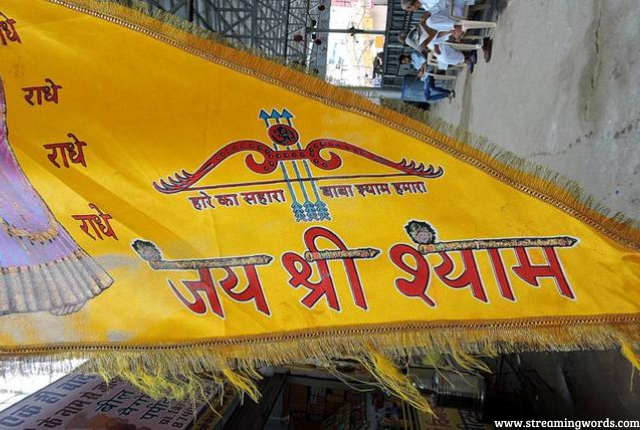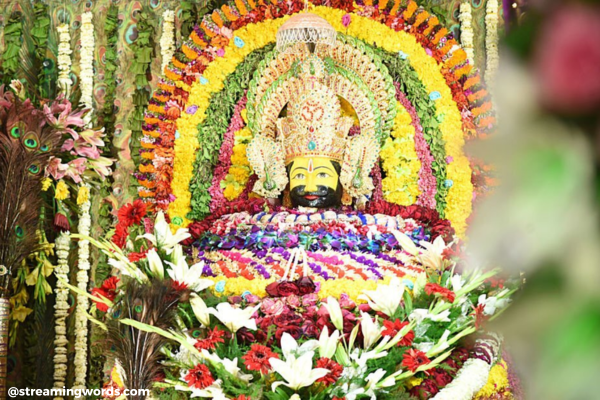In Hindu mythology, the epic Mahabharata is a treasure trove of fascinating characters and divine beings. One such deity is Khatu Shyam, also known as Barbarik or Shyam Baba. While most Hindu gods are associated with victory, Khatu Shyam stands out as a unique deity who is believed to bring defeat to his devotees in the great battle of the Mahabharata. In this article, we delve into the intriguing story of Khatu Shyam and explore the significance of his association with defeat.
The Legend of Barbarik
The origin of Khatu Shyam can be traced back to the character of Barbarik in the Mahabharata. He was the son of Ghatotkacha, an grand son of Bhima and Hidimba. Legend has it that Barbarik possessed extraordinary powers and was an exceptional warrior, capable of defeating anyone in battle. Impressed by his skills, Lord Krishna visited him in the guise of a Brahmin and put forth a test to gauge his prowess.
The Test of Three Arrows:

In the test, Lord Krishna challenged Barbarik to tie all the leaves of a tree together using only three arrows. Barbarik confidently accepted the challenge and began using his divine arrows. As he shot the first arrow, it started piercing through each leaf and tying them together. To his surprise, he realized that the arrow had pierced through his own thumb, causing a drop of blood to fall onto the ground.
Krishna’s Revelation
When Barbarik inquired about the significance of the blood, Lord Krishna revealed the depth of his divine power. Krishna explained that the tree represented the entire Kuru Dynasty, and each leaf symbolized a warrior. The blood drop represented the bloodshed that would occur in the great war of the Mahabharata. Astonished by this revelation, Barbarik understood the magnitude of the conflict and expressed his desire to participate.
Read Also: Best 15 Souvenirs To Shop In Jaipur
The Boon and the Curse
Impressed by Barbarik’s dedication and selflessness, Lord Krishna granted him a boon. Barbarik requested that he be allowed to witness the entire war, promising to fight on the side of the weaker party. Lord Krishna granted him his wish but also imposed a condition. Barbarik’s head was severed and placed on a hill, and it was decreed that he would be able to observe the entire battle only if he agreed to support the side that had less power at any given moment.
Khatu Shyam and Devotion
Khatu Shyam, also known as Barbarik, is now worshipped as a deity in the form of a young boy with a peacock feather on his head. Devotees believe that by seeking his blessings, they can attain victory over their personal battles and challenges. Despite his association with defeat, people approach Khatu Shyam with reverence and faith, understanding that his divine intervention serves a higher purpose.
Significance and Teachings
The association of Khatu Shyam with defeat in the Mahabharata carries deeper symbolic meaning. It teaches devotees the importance of humility, selflessness, and the understanding that defeat can sometimes be a stepping stone to greater victories. By embracing defeat and surrendering to a higher power, individuals can learn valuable lessons, grow spiritually, and ultimately attain success in their endeavors.
The Power of Devotion
Devotees of Khatu Shyam believe that sincere devotion and unwavering faith in him can bring about miraculous transformations in their lives. They visit the famous Khatu Shyam Temple in Rajasthan, India, which is dedicated to him. The temple attracts a large number of devotees who seek blessings and offer prayers to Khatu Shyam. It is believed that the deity listens to the prayers of his devotees and grants their wishes.
Symbolism of Defeat
While the association of Khatu Shyam with defeat may seem unconventional, it carries symbolic significance. It reminds devotees that victory and defeat are not solely determined by external circumstances, but also by one’s inner disposition and alignment with divine will. It teaches humility and encourages individuals to embrace challenges as opportunities for growth and self-improvement. By surrendering to the greater wisdom of the universe, devotees learn to navigate life’s ups and downs with grace and resilience.
Lessons in Karma and Dharma
The story of Khatu Shyam highlights the concepts of karma and dharma, central principles in Hindu philosophy. It emphasizes that even a powerful warrior like Barbarik had to abide by the laws of karma and dharma. Barbarik’s commitment to fighting for the weaker side aligns with the principle of righteous action and selflessness. It encourages individuals to consider their actions and the impact they have on others, promoting the values of fairness, justice, and compassion.
Universal Appeal
Although Khatu Shyam is primarily worshipped in the northern regions of India, his appeal extends beyond geographical boundaries. Devotees from various backgrounds, castes, and religions visit the temple and seek his blessings. The deity’s compassionate nature and his association with overcoming adversity resonate with people facing challenges in different aspects of their lives. Khatu Shyam serves as a unifying force, bringing people together in their shared pursuit of spiritual growth and divine connection.
Conclusion:
Khatu Shyam, the deity associated with defeat in the Mahabharata, presents a unique aspect of Hindu mythology. His story of sacrifice, devotion, and the pursuit of a higher purpose resonates with believers seeking spiritual growth and guidance. The association of defeat with Khatu Shyam serves as a reminder that setbacks and challenges are part of life’s journey, and through faith, humility, and surrender, individuals can overcome obstacles and emerge stronger. As devotees continue to seek solace and blessings from Khatu Shyam, his story remains a testament to the profound wisdom and diverse characters found within Hindu mythology.




